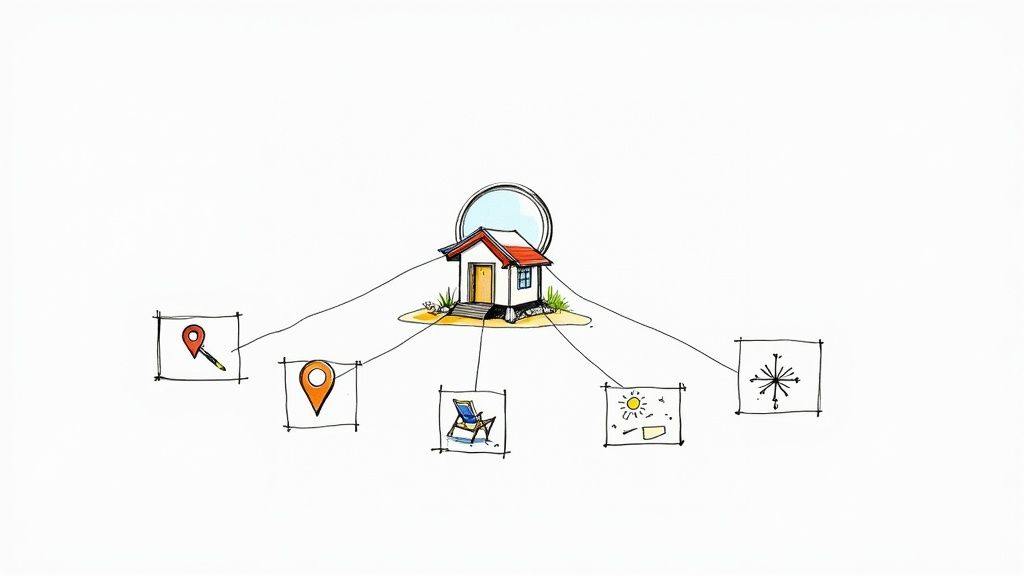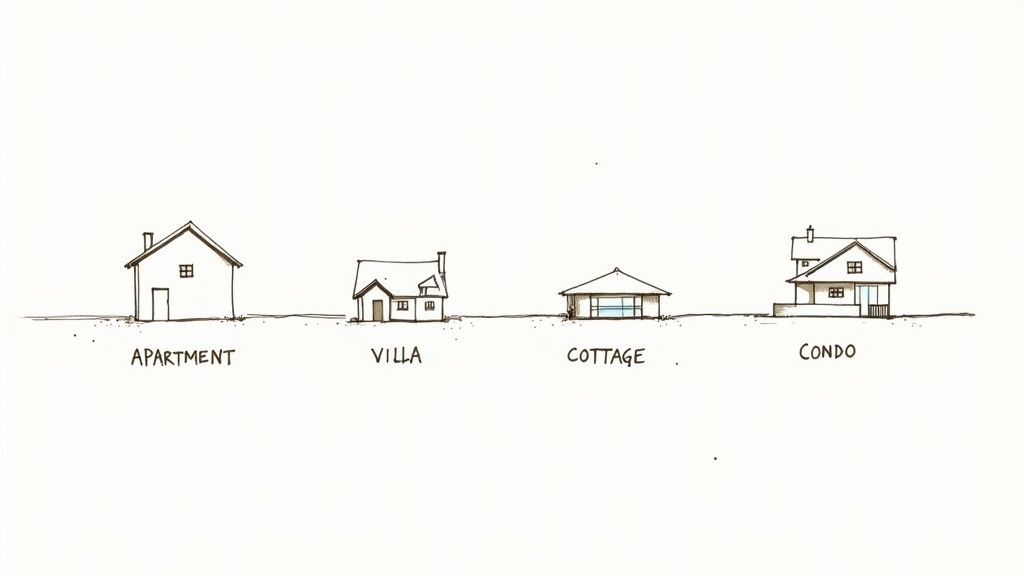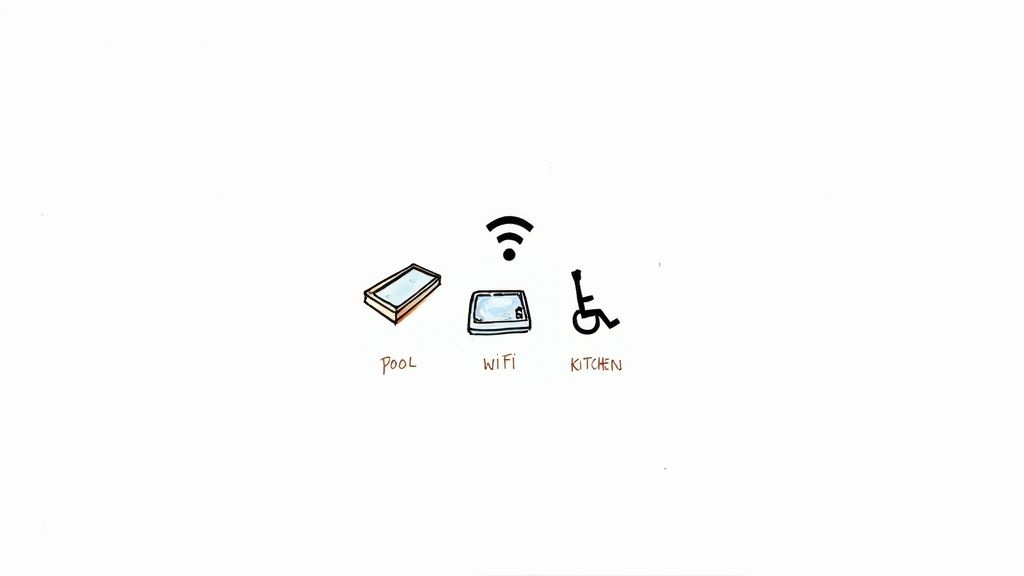
keywords for vacation rentals
keywords for vacation rentals: 8 tips to boost bookings
Posted on Nov 16, 2025

In the crowded short-term rental market, visibility is everything. Attracting direct bookings isn't about luck; it's about a calculated strategy. The foundation of a powerful online presence lies in using the right keywords for vacation rentals. These are the specific words and phrases potential guests type into search engines like Google when dreaming up and planning their next getaway. By understanding and implementing these search terms, you can connect directly with your ideal audience at the exact moment they are ready to book.
This guide moves beyond generic advice and provides a comprehensive roundup of the keyword categories that drive real results. We will break down the eight most crucial types of keywords, from location-based queries to amenity-specific searches, that will transform your SEO from a guessing game into a revenue-generating machine. To truly unlock this potential, the foundational step is learning how to do keyword research effectively to understand your audience's search language and intent.
Mastering these concepts ensures your properties are seen by the right travelers, every single time. Get ready to fill your booking calendar by mastering the language of your guests. We will cover:
- Destination & Location-Based Keywords
- Property Type & Accommodation Keywords
- Amenities & Features Keywords
- Travel Style & Experience Keywords
- Seasonal & Holiday Keywords
- Budget & Price-Range Keywords
- Guest Demographics & Accessibility Keywords
- Search Intent & Problem-Solution Keywords
1. Destination & Location-Based Keywords
The most fundamental and high-impact keywords for vacation rentals are those tied to a specific geographic location. These are the terms potential guests use when they already know where they want to go and are actively searching for accommodation. This category forms the bedrock of your SEO strategy, as it directly captures high-intent traffic from travelers in the booking phase.

This strategy works by aligning your property listings, website content, and marketing materials with the precise geographical terms users are typing into search engines. It’s about being the most relevant answer when someone searches for "vacation rental in [Your City]." Mastering this category is essential for discoverability on both major platforms like Airbnb and Vrbo and on your direct booking site.
Why It Works & When to Use It
Destination-based keywords are crucial because they match the most common search patterns of travelers. A guest looking for a stay in Miami will almost always start their search with "Miami vacation rental," "Miami Beach condo," or a similar phrase. Using these keywords ensures you appear in front of this highly qualified audience.
Key Insight: This keyword type targets users with strong transactional intent. They have already chosen their destination and are now evaluating their accommodation options, making them more likely to convert.
Actionable Implementation Tips
To effectively leverage location-based keywords, go beyond just the city name. A granular approach will yield the best results and help you stand out from the competition.
- Go Hyper-Local: Instead of only targeting "[City] vacation rental," drill down to specific neighborhoods, districts, or even famous streets. For example, target "French Quarter condo New Orleans" or "Williamsburg Brooklyn apartment rental."
- Leverage Landmarks: Incorporate nearby points of interest into your keyword phrases. Think "cabin near Dollywood" or "downtown Chicago apartment near Millennium Park." This captures users planning their itinerary.
- Create Dedicated Location Pages: If you manage properties in multiple distinct areas, build a unique page on your website for each one. This allows you to deeply optimize for specific local keywords and provide tailored content. For a more comprehensive look at optimizing your site structure, you can explore detailed strategies in our guide to SEO for vacation rentals.
2. Property Type & Accommodation Keywords
After defining where they want to go, travelers immediately focus on what kind of place they want to stay in. Property type keywords cater to this next step in the booking journey, allowing you to connect with guests who have specific accommodation preferences, whether they're dreaming of a rustic cabin, a chic downtown loft, or a sprawling villa. This category is about describing the physical nature and style of your rental.

This strategy involves using descriptive terms like "condo," "cottage," "house," "apartment," or "villa" in your listings and website content. By clearly defining your property type, you pre-qualify potential guests and attract those whose expectations align with what you offer. It’s a crucial layer of specificity that builds on location-based keywords to narrow the search for the perfect traveler.
Why It Works & When to Use It
Using property type keywords is effective because it speaks directly to a guest's travel style and needs. A family of five isn't looking for a "studio apartment," and a solo business traveler likely doesn't need a "5-bedroom house." These terms act as powerful filters, helping you show up in more relevant search results on OTAs and search engines.
Key Insight: This keyword type targets users moving from location awareness to accommodation consideration. They are refining their search based on the size, style, and type of experience they desire, signaling a strong intent to book a property that fits their vision.
Actionable Implementation Tips
Effectively implementing these keywords means being both accurate and evocative. Your goal is to paint a clear picture of the accommodation type while capturing the imagination of your ideal guest.
- Be Specific and Accurate: Use the most precise term for your property. Is it a "beachfront condo" or a "gulf-front bungalow"? A "mountain chalet" or a "rustic A-frame cabin"? The more specific you are, the better you'll match niche searches.
- Combine with Location: The real power comes from combining property type with location. For instance, target "beachfront cottage rentals in Cape Cod" or "modern apartment with city views in Barcelona."
- Highlight Unique Styles: If your property has a distinct architectural style, use it. Keywords like "mid-century modern house," "Tudor-style cottage," or "Victorian home rental" can attract design-savvy travelers. For help crafting compelling narratives around these features, see our guide on vacation rental property description examples.
3. Amenities & Features Keywords
After guests decide on a location, their search narrows based on specific property features and amenities. These keywords target travelers who have moved beyond the "where" and are now focused on the "what," looking for specific comforts, conveniences, or luxuries that will define their stay. This category is essential for attracting guests whose booking decisions hinge on practical needs and desired experiences.

This strategy involves highlighting the specific, tangible attributes of your property. By optimizing your listings and website content for terms like "vacation rental with a pool" or "pet-friendly cabin," you capture a segment of the market with very clear, non-negotiable requirements. These are often the final decision-making factors that can make your property stand out in a crowded marketplace.
Why It Works & When to Use It
Amenity-based keywords are powerful because they cater to the practical and emotional needs of travelers. A family with young children might exclusively search for properties with a "washer and dryer," while a couple on a romantic getaway might prioritize a "hot tub with a view." Using these keywords connects you directly with guests whose needs you are perfectly equipped to meet.
Key Insight: This keyword type targets users in the comparison and consideration stage. They are actively filtering options, and a property that explicitly lists their desired feature is far more likely to make their shortlist and secure the booking.
Actionable Implementation Tips
Effectively using amenity keywords requires being specific, honest, and strategic. Your goal is to match your property's best features with the exact phrases guests are searching for.
- Be Highly Specific: Go beyond generic terms. Instead of just "pool," use "vacation rental with heated infinity pool." Instead of "pet-friendly," try "cabin for rent with fenced yard for dogs."
- Combine with Other Keywords: The most potent searches combine amenities with location or property type. Target long-tail phrases like "downtown Austin condo with rooftop pool" or "beachfront Outer Banks house with private boardwalk."
- Highlight Unique Selling Points: Do you have a feature your competitors lack? Make it a core part of your keyword strategy. Terms like "home with EV charger," "villa with a private chef's kitchen," or "apartment with a Peloton bike" can attract a premium, niche audience. For a deeper dive into which features drive conversions, explore our guide to the 14 must-have features for a high-converting short-term rental website.
4. Travel Style & Experience Keywords
Beyond the where and the what, savvy travelers search for the why. Experience-based keywords target the specific type of trip a guest is planning, allowing you to connect with them on an emotional and aspirational level. This category moves beyond physical features to capture the mood, purpose, and style of a potential stay, tapping into powerful search intent.

This strategy involves positioning your property not just as a place to sleep, but as the perfect setting for a specific experience. By using terms like "romantic getaway" or "family-friendly retreat," you align your marketing with the guest's core motivation for traveling. This is a highly effective way to differentiate your rental in a crowded market and attract guests who are a perfect fit for what your property offers.
Why It Works & When to Use It
Experience-based keywords work because they answer a more nuanced question than simple location searches. A couple searching for a "romantic getaway cabin" has a very different set of expectations than a group looking for an "adventure base camp." Using these terms pre-qualifies your audience and attracts guests who will value the unique experience you provide, often leading to better reviews and higher satisfaction.
Key Insight: This keyword type targets users in the inspiration and planning stages. By showing them you understand the kind of trip they want, you build immediate rapport and position your property as the ideal solution for their travel goals.
Actionable Implementation Tips
To effectively use travel style keywords, you must deeply understand your ideal guest and authentically market the experience your property delivers. A targeted approach is essential for success.
- Define Your Niche: Identify the primary experience your property offers. Is it a "secluded romantic getaway," a "digital nomad work-cation spot," or a "family-friendly home for a reunion"? Focus your keyword strategy on one or two core styles.
- Craft Thematic Content: Create dedicated blog posts or landing pages around these experiences. For example, write a guide to "The Ultimate Romantic Weekend in [Your City]" featuring your property, or a post on "Top Family Activities Near Our Beach House."
- Use Evocative Language: Weave experience-based keywords into your property descriptions, titles, and photo captions. Use phrases like "the perfect base for your hiking adventure" or "unwind and reconnect at our wellness retreat."
- Show, Don't Just Tell: Your imagery must match the experience you're selling. If you're targeting "romantic getaways," showcase photos of couples enjoying the sunset from your balcony, not just an empty room. This visual proof is crucial for conversion.
5. Seasonal & Holiday Keywords
Travel is inherently tied to the calendar, and savvy vacation rental managers can capitalize on this by targeting keywords related to specific seasons, holidays, and events. These keywords capture travelers who are planning their trips around a particular time of year, whether it's a summer beach escape, a cozy winter holiday, or a festival weekend. This category allows you to attract guests with time-sensitive booking intent.
This strategy involves anticipating travel trends and creating content and promotions that align with the calendar. By optimizing your listings and website for terms like "Christmas family cabin" or "summer beach house rental," you position your properties as the perfect solution for time-sensitive travel plans. This proactive approach ensures you are visible when demand for specific dates begins to spike.
Why It Works & When to Use It
Seasonal and holiday keywords are effective because they tap into the excitement and urgency of trip planning for specific events. A family looking for a Thanksgiving getaway isn't just searching for a "cabin"; they're searching for a "Thanksgiving cabin rental" with a large kitchen. Using these keywords connects your property's features to the guest's specific holiday vision.
Key Insight: This keyword category targets users with both high emotional investment and clear temporal intent. Their search is driven by a non-negotiable date or season, making them highly motivated to book a suitable property in advance.
Actionable Implementation Tips
To effectively use seasonal keywords for vacation rentals, you must plan ahead and align your marketing with the calendar. A strategic, timely approach is key to capturing this demand.
- Plan and Publish in Advance: Begin targeting holiday and seasonal keywords 3-6 months before the actual dates. Create dedicated blog posts or landing pages like "Your Guide to a Perfect Christmas in [Your City]" or "Top Summer Activities Near Our Beachfront Condo."
- Target Both Planners and Procrastinators: Create campaigns for "early bird summer 2024 deals" to attract planners. Later, pivot to capture last-minute searches with terms like "last-minute New Year's Eve rental" or "4th of July weekend availability."
- Incorporate the Year: Add the upcoming year to your keywords (e.g., "Thanksgiving 2024 vacation rental") to signal that your information and availability are current, which can improve click-through rates.
- Align Content with the Season: Ensure your property descriptions, photos, and social media posts reflect the season you are targeting. Showcase a cozy fireplace for winter holiday keywords or a sparkling pool for summer vacation searches.
6. Budget & Price-Range Keywords
A significant portion of travelers begin their search with a specific budget in mind. Budget and price-range keywords directly address this by targeting search queries that include financial constraints or desires, such as "cheap," "luxury," "affordable," or specific nightly rates. This category is essential for attracting guests who have already defined their spending limits and are looking for properties that match.
This strategy works by explicitly signaling your property's price point within your listings, website content, and ad copy. When a traveler searches for a "budget cabin under $150 a night," being the property that uses those exact terms gives you a massive advantage. It filters out mismatched inquiries and connects you directly with a highly motivated and financially qualified audience.
Why It Works & When to Use It
Price is often a primary decision-making factor in booking a vacation rental. By using budget-based keywords, you tap into a powerful search intent, capturing users who are comparing options based on cost. This is especially effective in competitive markets where price differentiation can be a key selling point, whether you are positioning your property as a high-end luxury escape or a cost-effective family retreat.
Key Insight: This keyword type targets users with high commercial intent who are in the final stages of their decision-making process. They are no longer just browsing; they are actively seeking to book a property that fits their wallet.
Actionable Implementation Tips
To effectively use budget-related keywords, you must be transparent and strategic. The goal is to set clear expectations and attract the right type of guest without devaluing your offering.
- Be Specific and Honest: Use clear and accurate price-based modifiers. Instead of just "affordable," try "vacation rental under $200 per night." If you run a luxury property, use terms like "premium villa" or "exclusive retreat" to attract guests willing to pay for a high-end experience.
- Create Tiered Content: If you manage a portfolio of properties with varied price points, create separate website pages or blog posts targeting each segment. For example, have a page for "Affordable Family Rentals in Orlando" and another for "Luxury Orlando Villas with Private Pools."
- Highlight Value, Not Just Price: For budget-friendly listings, pair price keywords with value propositions like "affordable cabin with free parking" or "cheap apartment with full kitchen." For luxury listings, justify the cost with keywords like "luxury penthouse with panoramic views."
7. Guest Demographics & Accessibility Keywords
Beyond the property itself, successful keyword targeting involves understanding who your ideal guest is. Keywords based on guest demographics and accessibility needs cater to specific traveler profiles, allowing you to connect with underserved yet highly motivated audiences. This approach positions your rental as the perfect solution for travelers with unique requirements, such as those with pets, children, or mobility challenges.
This strategy involves integrating terms that address specific traveler needs directly into your property descriptions, titles, and website content. Instead of competing for broad terms, you attract niche markets by explicitly stating that you welcome them and have the facilities to accommodate them. This not only improves your visibility within these searches but also builds trust and demonstrates inclusivity, setting your property apart from generic listings.
Why It Works & When to Use It
These keywords are effective because they answer a critical, often non-negotiable, question for a traveler. A family with a toddler isn't just looking for a "beach house"; they need a "toddler-friendly beach house with a crib." A person using a wheelchair needs to know if a rental is genuinely "wheelchair accessible with a roll-in shower." This is a powerful category of keywords for vacation rentals because it meets a direct, practical need.
Key Insight: These keywords capture high-intent travelers whose booking decisions are constrained by specific requirements. If you can meet their needs and prove it with your listing, you dramatically reduce their search friction and increase your conversion rate.
Actionable Implementation Tips
Effectively targeting demographic and accessibility keywords requires honesty, detail, and a focus on building confidence with potential guests.
- Be Hyper-Specific and Honest: Do not just say "accessible." Specify the features, such as "wheelchair accessible villa with ramp access" or "cottage with grab bars in the bathroom." Misrepresenting accessibility can lead to negative reviews and legal issues.
- Detail Your Policies Clearly: For pet-friendly rentals, mention any restrictions, fees, or special amenities like a fenced yard or dog beds. For family-friendly properties, list available items like high chairs, pack-n-plays, and safety gates.
- Show, Don't Just Tell: Use photos and videos to visually confirm your claims. Include pictures of the ramp, the walk-in shower, or the secure backyard for pets. This visual proof is often the deciding factor for guests with specific needs.
- Gather Targeted Social Proof: Encourage guests from these demographics to leave detailed reviews. A testimonial from a previous guest who used a wheelchair or brought their children provides powerful validation that resonates with future travelers.
8. Search Intent & Problem-Solution Keywords
Beyond describing what your property is, this advanced category of keywords focuses on what your property does for a guest. These terms are designed to solve a specific problem or fulfill a distinct need, directly matching the "why" behind a traveler's search. This approach moves from features (e.g., "large table") to solutions (e.g., "family reunion villa").
This strategy works by anticipating the specific challenges or desires of niche travel groups and positioning your property as the perfect solution. It taps into the language of problem-solving, capturing highly motivated guests who are looking for a rental that meets a very particular set of requirements. This is a powerful way to use keywords for vacation rentals to connect with an audience that larger, more generic listings might miss.
Why It Works & When to Use It
Problem-solution keywords are effective because they connect with guests on a deeper level, addressing their core travel motivations. When a guest searches for a "quiet villa for remote work," they aren't just looking for a place with Wi-Fi; they are looking for a guarantee of productivity and peace. Use this strategy when your property has unique features that solve common traveler pain points or cater to specific events.
Key Insight: This keyword type targets users with high informational and transactional intent. They have a clear problem and are actively seeking the ideal solution, making them willing to book a property that perfectly meets their needs.
Actionable Implementation Tips
To leverage this approach, you must think like your ideal guest and identify the problems your property can solve. A deep understanding of different travel personas is critical for success.
- Identify Guest Pain Points: Brainstorm common travel frustrations. Is it finding a place for a large group, a truly quiet space to work, or a venue suitable for a small wedding? Create content around these solutions. For example, "spacious villa for 20+ person group reunion" or "private villa with dedicated office setup."
- Target Specific Use Cases: Develop landing pages or blog posts dedicated to how your rental serves a specific purpose. A page titled "The Ultimate Remote Work Retreat in [Your City]" can be optimized for keywords like "work-from-home vacation rental" and "long-stay digital nomad apartment."
- Optimize for Question-Based Searches: Many problem-solving searches are phrased as questions ("where can I find a pet-friendly cabin with a fenced yard?"). Answering these questions directly in your content and FAQ sections can capture valuable voice search traffic.
- Think Long-Tail: These niche, problem-solving phrases are often longer and more descriptive. For capturing niche markets and addressing very specific traveler needs, understanding long-tail keywords can significantly enhance your search visibility.
8-Category Comparison of Vacation Rental Keywords
| Keyword Type | Implementation Complexity | Resource Requirements | Expected Outcomes | Ideal Use Cases | Key Advantages |
|---|---|---|---|---|---|
| Destination & Location-Based Keywords | Low — add location tags/pages | Low–Medium — location pages, local SEO, maps | Improved local visibility and qualified destination traffic | City/neighborhood targeting, tourist spots, local searches | High intent; strong local SEO; easy to apply |
| Property Type & Accommodation Keywords | Low — categorize listings clearly | Low — accurate metadata, photos | Better filtering and higher qualified leads | Distinct accommodation styles (villa, cottage, studio) | Specific intent; reduces inquiry mismatches |
| Amenities & Features Keywords | Medium — detailed attributes and verification | Medium — amenity documentation, photos, seasonal updates | Higher conversion from needs-based searchers; differentiation | Properties with standout or accessibility features | Differentiates similar listings; attracts requirement-driven guests |
| Travel Style & Experience Keywords | Medium — persona-driven pages and content | Medium–High — tailored content, imagery, testimonials | Niche traffic with higher engagement and booking motivation | Experiential stays (honeymoon, adventure, remote work) | Enables emotional positioning and niche targeting |
| Seasonal & Holiday Keywords | Medium — calendar-driven campaigns and pages | Medium — timely content, promo setup, pricing updates | Time-sensitive booking spikes during peaks | Peak seasons, holidays, events, last-minute bookings | Captures high-intent seasonal demand; supports pricing strategy |
| Budget & Price-Range Keywords | Low–Medium — price segmentation and labels | Medium — pricing strategy, separate pages/listings | Attracts price-conscious guests; filters mismatches | Targeting budget travelers or premium segments | Clear market positioning; brings qualified leads |
| Guest Demographics & Accessibility Keywords | Medium–High — verify features and policies | High — physical adaptations, certifications, documentation | Strong conversion within specific demographics; trust-building | Pet-friendly, family-ready, senior or accessibility-focused properties | Opens underserved markets; demonstrates inclusivity |
| Search Intent & Problem-Solution Keywords | High — research, varied landing pages, content strategy | Medium–High — content creation, SEO testing, targeted pages | High conversion for problem-driven searches; supports content marketing | Use cases (weddings, remote work, large groups, quiet retreats) | Addresses specific pain points; versatile marketing angles |
From Keywords to Conversions: Putting Your Strategy into Action
We've explored the extensive landscape of keywords for vacation rentals, journeying through eight critical categories that form the bedrock of a powerful direct booking strategy. From hyper-specific location-based terms and amenity-focused queries to the nuanced language of travel styles and seasonal demand, you now have a comprehensive blueprint for attracting your ideal guests. The goal is no longer just to be found, but to be found by the right travelers at the precise moment they are ready to book.
This journey from a generic search to a confirmed booking is paved with strategic keyword implementation. It's about understanding that a guest searching for a "pet-friendly cabin with hot tub in Asheville" has a much higher booking intent than someone searching for "things to do in North Carolina." Mastering these keyword categories empowers you to meet guests at every stage of their planning process, building trust and showcasing your properties as the perfect solution to their travel needs.
Your Strategic Roadmap: From Insight to Implementation
The true power of this keyword knowledge is unlocked when you translate it into tangible actions. It's not about stuffing every possible term into your descriptions; it's about a methodical and data-informed approach to digital marketing. Your next steps should focus on prioritization and integration.
Here is a simple, actionable roadmap to get started:
- Conduct a Keyword Audit: Review your current property listings, website copy, and blog content. Which keyword categories are you already covering well? Where are the glaring gaps? Use this article as a checklist to identify immediate opportunities for improvement.
- Prioritize High-Intent Keywords: Focus your initial efforts on keywords that signal a strong desire to book. These often include long-tail phrases that specify dates, amenities, and property types (e.g., "3-bedroom beachfront condo Siesta Key for July"). These are your conversion drivers.
- Integrate Naturally Across Your Assets: Weave your chosen keywords seamlessly into every digital touchpoint. This includes your property titles and headlines, detailed descriptions, photo captions and alt text, URL slugs, and dedicated blog posts or landing pages. Remember, you're writing for humans first, search engines second.
- Track, Analyze, and Adapt: SEO is not a "set it and forget it" task. Use tools like Google Analytics and Google Search Console to monitor which keywords are driving traffic and bookings. Pay attention to performance, identify what’s working, and continually refine your strategy based on real-world data.
Key Takeaway: A successful keyword strategy isn't just about volume; it's about relevance and intent. By aligning your keyword usage with the specific desires and problems of your target guests, you transform your website from a simple listing platform into a high-performance direct booking engine that consistently drives revenue and growth.
Ultimately, mastering keywords for vacation rentals is about speaking your guests' language. It's about anticipating their needs, understanding their dreams, and positioning your properties as the undeniable answer. By moving beyond generic terms and embracing the rich, descriptive language of travel, you build a powerful connection that not only captures attention but also drives conversions, securing your business's success in an increasingly competitive market.
Ready to automate your keyword strategy and scale your direct bookings without the manual effort? hostAI leverages advanced AI to conduct hyper-local keyword research and implements programmatic SEO across your digital assets, ensuring your properties rank for the most valuable terms. Discover how to build a powerful direct booking engine at hostAI.